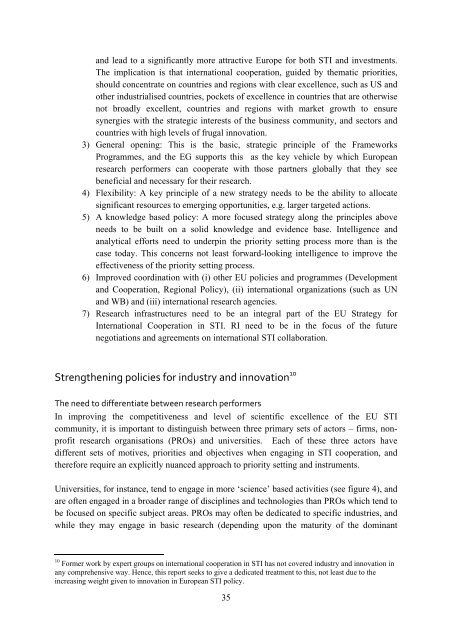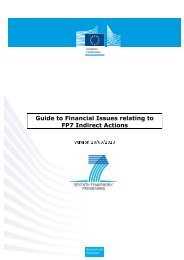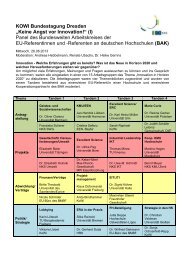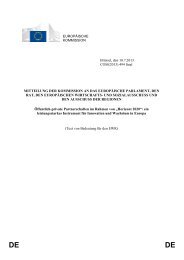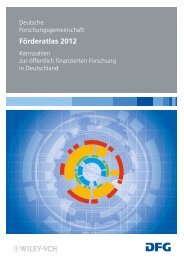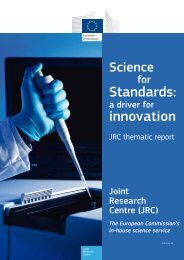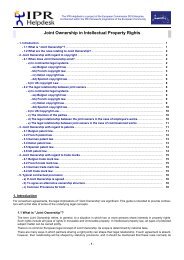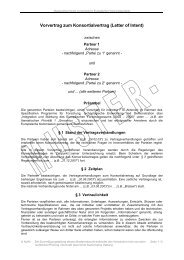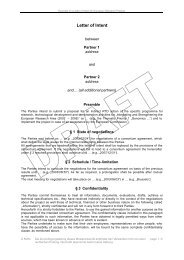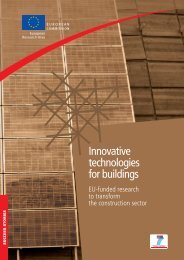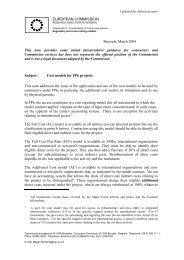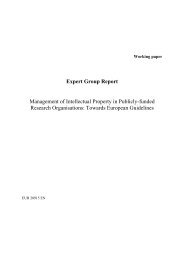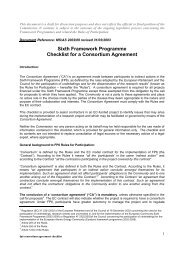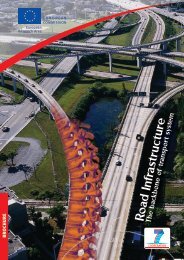Draft Report of the Expert Group on International STI Cooperation to ...
Draft Report of the Expert Group on International STI Cooperation to ...
Draft Report of the Expert Group on International STI Cooperation to ...
You also want an ePaper? Increase the reach of your titles
YUMPU automatically turns print PDFs into web optimized ePapers that Google loves.
and lead <strong>to</strong> a significantly more attractive Europe for both <strong>STI</strong> and investments.<br />
The implicati<strong>on</strong> is that internati<strong>on</strong>al cooperati<strong>on</strong>, guided by <str<strong>on</strong>g>the</str<strong>on</strong>g>matic priorities,<br />
should c<strong>on</strong>centrate <strong>on</strong> countries and regi<strong>on</strong>s with clear excellence, such as US and<br />
o<str<strong>on</strong>g>the</str<strong>on</strong>g>r industrialised countries, pockets <str<strong>on</strong>g>of</str<strong>on</strong>g> excellence in countries that are o<str<strong>on</strong>g>the</str<strong>on</strong>g>rwise<br />
not broadly excellent, countries and regi<strong>on</strong>s with market growth <strong>to</strong> ensure<br />
synergies with <str<strong>on</strong>g>the</str<strong>on</strong>g> strategic interests <str<strong>on</strong>g>of</str<strong>on</strong>g> <str<strong>on</strong>g>the</str<strong>on</strong>g> business community, and sec<strong>to</strong>rs and<br />
countries with high levels <str<strong>on</strong>g>of</str<strong>on</strong>g> frugal innovati<strong>on</strong>.<br />
3) General opening: This is <str<strong>on</strong>g>the</str<strong>on</strong>g> basic, strategic principle <str<strong>on</strong>g>of</str<strong>on</strong>g> <str<strong>on</strong>g>the</str<strong>on</strong>g> Frameworks<br />
Programmes, and <str<strong>on</strong>g>the</str<strong>on</strong>g> EG supports this as <str<strong>on</strong>g>the</str<strong>on</strong>g> key vehicle by which European<br />
research performers can cooperate with those partners globally that <str<strong>on</strong>g>the</str<strong>on</strong>g>y see<br />
beneficial and necessary for <str<strong>on</strong>g>the</str<strong>on</strong>g>ir research.<br />
4) Flexibility: A key principle <str<strong>on</strong>g>of</str<strong>on</strong>g> a new strategy needs <strong>to</strong> be <str<strong>on</strong>g>the</str<strong>on</strong>g> ability <strong>to</strong> allocate<br />
significant resources <strong>to</strong> emerging opportunities, e.g. larger targeted acti<strong>on</strong>s.<br />
5) A knowledge based policy: A more focused strategy al<strong>on</strong>g <str<strong>on</strong>g>the</str<strong>on</strong>g> principles above<br />
needs <strong>to</strong> be built <strong>on</strong> a solid knowledge and evidence base. Intelligence and<br />
analytical efforts need <strong>to</strong> underpin <str<strong>on</strong>g>the</str<strong>on</strong>g> priority setting process more than is <str<strong>on</strong>g>the</str<strong>on</strong>g><br />
case <strong>to</strong>day. This c<strong>on</strong>cerns not least forward-looking intelligence <strong>to</strong> improve <str<strong>on</strong>g>the</str<strong>on</strong>g><br />
effectiveness <str<strong>on</strong>g>of</str<strong>on</strong>g> <str<strong>on</strong>g>the</str<strong>on</strong>g> priority setting process.<br />
6) Improved coordinati<strong>on</strong> with (i) o<str<strong>on</strong>g>the</str<strong>on</strong>g>r EU policies and programmes (Development<br />
and Cooperati<strong>on</strong>, Regi<strong>on</strong>al Policy), (ii) internati<strong>on</strong>al organizati<strong>on</strong>s (such as UN<br />
and WB) and (iii) internati<strong>on</strong>al research agencies.<br />
7) Research infrastructures need <strong>to</strong> be an integral part <str<strong>on</strong>g>of</str<strong>on</strong>g> <str<strong>on</strong>g>the</str<strong>on</strong>g> EU Strategy for<br />
Internati<strong>on</strong>al Cooperati<strong>on</strong> in <strong>STI</strong>. RI need <strong>to</strong> be in <str<strong>on</strong>g>the</str<strong>on</strong>g> focus <str<strong>on</strong>g>of</str<strong>on</strong>g> <str<strong>on</strong>g>the</str<strong>on</strong>g> future<br />
negotiati<strong>on</strong>s and agreements <strong>on</strong> internati<strong>on</strong>al <strong>STI</strong> collaborati<strong>on</strong>.<br />
Streng<str<strong>on</strong>g>the</str<strong>on</strong>g>ning policies for industry and innovati<strong>on</strong> 10<br />
The need <strong>to</strong> differentiate between research performers<br />
In improving <str<strong>on</strong>g>the</str<strong>on</strong>g> competitiveness and level <str<strong>on</strong>g>of</str<strong>on</strong>g> scientific excellence <str<strong>on</strong>g>of</str<strong>on</strong>g> <str<strong>on</strong>g>the</str<strong>on</strong>g> EU <strong>STI</strong><br />
community, it is important <strong>to</strong> distinguish between three primary sets <str<strong>on</strong>g>of</str<strong>on</strong>g> ac<strong>to</strong>rs – firms, n<strong>on</strong>pr<str<strong>on</strong>g>of</str<strong>on</strong>g>it<br />
research organisati<strong>on</strong>s (PROs) and universities. Each <str<strong>on</strong>g>of</str<strong>on</strong>g> <str<strong>on</strong>g>the</str<strong>on</strong>g>se three ac<strong>to</strong>rs have<br />
different sets <str<strong>on</strong>g>of</str<strong>on</strong>g> motives, priorities and objectives when engaging in <strong>STI</strong> cooperati<strong>on</strong>, and<br />
<str<strong>on</strong>g>the</str<strong>on</strong>g>refore require an explicitly nuanced approach <strong>to</strong> priority setting and instruments.<br />
Universities, for instance, tend <strong>to</strong> engage in more ‘science’ based activities (see figure 4), and<br />
are <str<strong>on</strong>g>of</str<strong>on</strong>g>ten engaged in a broader range <str<strong>on</strong>g>of</str<strong>on</strong>g> disciplines and technologies than PROs which tend <strong>to</strong><br />
be focused <strong>on</strong> specific subject areas. PROs may <str<strong>on</strong>g>of</str<strong>on</strong>g>ten be dedicated <strong>to</strong> specific industries, and<br />
while <str<strong>on</strong>g>the</str<strong>on</strong>g>y may engage in basic research (depending up<strong>on</strong> <str<strong>on</strong>g>the</str<strong>on</strong>g> maturity <str<strong>on</strong>g>of</str<strong>on</strong>g> <str<strong>on</strong>g>the</str<strong>on</strong>g> dominant<br />
10 Former work by expert groups <strong>on</strong> internati<strong>on</strong>al cooperati<strong>on</strong> in <strong>STI</strong> has not covered industry and innovati<strong>on</strong> in<br />
any comprehensive way. Hence, this report seeks <strong>to</strong> give a dedicated treatment <strong>to</strong> this, not least due <strong>to</strong> <str<strong>on</strong>g>the</str<strong>on</strong>g><br />
increasing weight given <strong>to</strong> innovati<strong>on</strong> in European <strong>STI</strong> policy.<br />
35


